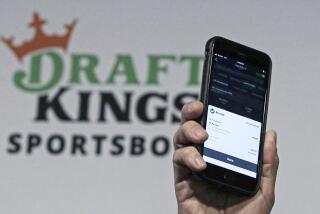State lawmakers move forward on regulating online fantasy sports sites

Devlin D’Zmura works on his laptop at DraftKings, a daily fantasy sports company.
Reporting from Sacramento — While some states have banned fantasy sports websites, California lawmakers on Wednesday took a step toward permitting, taxing and regulating the industry.
DraftKings, FanDuel and other Internet companies — asserting that fan wagering involves skill rather than luck — have created a billion-dollar business.
Officials in New York, Illinois and Washington have disagreed, determining that the sites constitute illegal gambling; other states have the issue under consideration.
On Wednesday, a California Assembly committee approved a bill that would allow such companies to operate in the state if they obtain a license and pay an annual regulatory fee.
Website operators would have to undergo a background check, as well as pay taxes on their profits and report player winnings to the state. Those winnings would then be taxed. Licensed operators would be responsible for determining that players are eligible adults and that there is no fraud in the games.
Governmental Organization Committee Chairman Adam Gray (D-Merced) said his bill recognizes the popularity of sports fantasy wagering in California while preventing fraud.
Should the California government be getting a piece of the action? Weigh in on Facebook >>
“In California, we have an opportunity to lead the way … to balance consumer protections with consumer demand for daily fantasy sports,” Gray said during the hearing.
“AB 1437 will put in place safeguards to ensure games are fair, prohibit underage usage, guard against identity theft and ensure that consumers are competing on a level playing field.”
Daily fantasy games are expected to generate about $3.72 billion in entry fees and $370 million in revenue this year, according to the industry consulting firm Eilers Research. Gray said California generates about 15% of that business.
The measure is opposed by some lawmakers and activists, including Fred Jones, head of the California Coalition Against Gambling Expansion.
“We take a principled stance against any expansion of gambling,” Jones said. “There are plenty of venues already, and we have a huge issue of problem and pathological gamblers.”
Players on daily fantasy websites select current professional athletes — who are priced at different levels — for their teams, staying within a set salary cap. The players pay an entry fee to put their fantasy teams up against others, with the results based on the athletes’ real-game performance.
NEWSLETTER: Get the day’s top headlines from Times Editor Davan Maharaj >>
Television commercials for some websites say knowledgeable bettors — who research athletes’ past performances and make educated wagers on their future successes — can win payouts of millions of dollars.
But opponents say fantasy leagues are a game of chance because the players don’t control the performance of athletes.
Assemblyman Marc Levine (D-San Rafael), the only lawmaker on the 18-member committee to vote against the bill, said that to be approved it must be submitted to the voters.
“Gambling in California has been approved by voters since 1933,” Levine said, citing enterprises that include the state lottery, horse racing and tribal casinos.
The measure is supported by the Los Angeles Clippers and Anschutz Entertainment Group — whose head, Philip Anschutz, owns 27% of the Lakers.
Representatives of the fantasy websites did not testify at the hearing, but DraftKings spokesman Griffin Finan later issued a statement saying: “We thank chairman Gray for taking the lead on this issue and look forward to working with the legislature in California, as we are in other states, while the bill advances through the … process.”
Twitter: @mcgreevy99
ALSO
Opponents of California’s aid-in-dying law come up short
Ballot proposal could worsen L.A. housing crisis, mayor says
5-hour meeting ends without a decision on an L.A. schools chief
More to Read
Get the L.A. Times Politics newsletter
Deeply reported insights into legislation, politics and policy from Sacramento, Washington and beyond. In your inbox three times per week.
You may occasionally receive promotional content from the Los Angeles Times.











